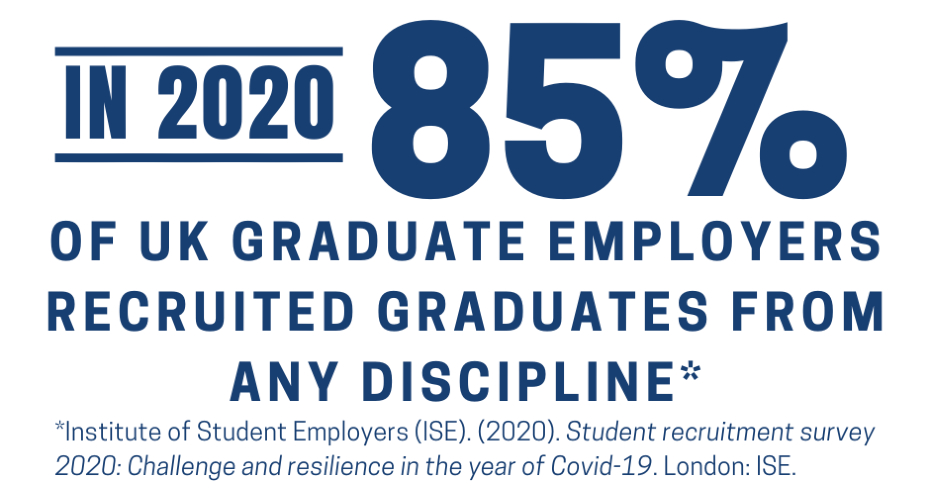
Amelia Banton, BA History (2022)
'The civil service is so broad and there are so many jobs you didn’t even know existed.'
Tax Specialist Programme Trainee, HM Revenue and Customs

What can I do with a degree in History?
The below offers a selection of the destinations University of Exeter graduates from History have gone on to. The information below is not exhaustive, however it does highlight the range of job and further study options available to you after your studies.
If you would like to learn more about any of the jobs listed below you may wish to browse the job profiles on the Prospects website.
Careers with a degree in History
Recent History graduates from the University of Exeter have entered a wide range of careers. Some recent examples include*:
|
Account Executive |
Journalist |
|
Accountant |
Librarian |
|
Administrative Officer |
Logistics Manager |
|
Advocacy Researcher |
Management Consultant |
|
Analyst (Policy) |
Marketing Executive |
|
Associate Consultant (Business) |
Mergers and Acquisitions Analyst |
|
Audit Associate |
Operations Manager |
|
Business Analyst |
Paralegal |
|
Civil Servant (Fast Stream) |
Parliamentary Assistant |
|
Commercial Analyst |
Police Officer |
|
Communications Officer |
Policy Advisor |
|
Community and Events Fundraiser |
PR Executive |
|
Data Analyst |
Project Manager |
|
Digital Marketing Consultant/ Executive |
Recruitment Consultant |
|
Editor |
Research Analyst |
|
Events Coordinator/ Manager |
Sales Consultant |
|
Financial Analyst |
Teacher |
|
Global Markets Researcher |
Strategic Communications Consultant |
|
Project Manager |
Sustainability Consultant |
|
History Teacher |
Television Researcher |
|
Intelligence Analyst |
Tour Guide |
In 2020, 85% of UK graduate employers recruited graduates from any degree subject*. This means that they accept and welcome applications from all graduates.
Use the list of graduate careers as a source of information and inspiration; don’t restrict your search to the roles listed above.
(*Institute of Student Employers (ISE), 2020)
Other resources:
- Employment sector pages
- Prospects to find out more about job profiles
- Graduate Outcomes Data to do a deep dive into the data on what Politics and International Relations graduates do after their degree
- University of Exeter LinkedIn Alumni Tool - this tool allows you to find graduates from your discipline and see their current role and employer. Learn how to use this tool by visiting our LinkedIn page.
- Alumni Profiles database to explore what Politics and International Relations graduates do after their degree
*Graduate Outcomes data taken from full-time, first-degree students completing in 2017/18 to 2021/22.
Employers of Exeter alumni with a degree in History
History graduates from the University of Exeter have joined a wide range of employers. Some recent example include*:
|
PricewaterhouseCoopers (PWC) |
|
*Graduate Outcomes data taken from full-time, first-degree students completing in 2017/18 to 2021/22.
Skills
An Exeter History degree will support you to develop a range of important specialist, technical, soft and transferable skills needed to succeed and thrive in your graduate career.
- Appreciate the different factors that influence the activities of groups and individuals in society.
- An understanding of key historical and political events that have shaped the world.
- Critical reasoning and analytical skills, exploring and learning with curiosity. Identify, analyse and interpret complex information drawn from a variety of sources.
- Prepare and present a coherent argument by selecting and ordering relevant evidence and communicating findings in a structured, with clarity and authority.
- Digital fluency: the ability to use digital tools and platforms, navigate key online platforms, critically evaluate online information, and effectively engage in online communication.
- Research: conduct qualitative and quantitative research using different tools, such as information and communications technology and sources, demonstrating intellectual rigour throughout.
- Innovative problem solving: formulating and advocating solutions and drawing independent conclusions.
- Teamwork: proactively collaborate, build authentic relationships, engage in groups, provide constructive feedback and positively influence group direction.
- Self-Motivation: independent taking of initiative, setting of goals, and perseverance in learning and solving challenging problems.
- Teamwork: effective collaboration within teams, sharing of knowledge, and contribution to achieving common goals.
- Time Management: prioritisation of tasks, efficient management of workloads, and deadlines.
Further Study
Around 32% of Exeter History graduates go on to pursue further study within 15 months of completing their undergraduate degree*. Some recent routes include**:
- MA Archaeology
- Economic and Social history MPhil
- Graduate Diploma Law
- MA International Heritage Management
- MA English Literary Studies
- MA History / History of Art / Global History / History and International Relations
- MA/MSc International Relations
- MA Medieval Studies/ MLitt Medieval History
- MPhil History
- MSc Empires, Colonialism and Globalisation
- MSc Social Research Methods
- MSc Sustainable Development
- MSc Theory and History of International Relations
- PGCE Secondary History & other subjects
Some went on to study degrees outside of the field including:
- MA Applied Security and Strategy
- MA Conflict, Security and Development
- MA Creative Arts in Education
- MA Broadcast Journalism
- MA Journalism
- MA Publishing
- Masters in Public Administration
- MSc Applied Data Science and Statistics
- MSc Development Management
- MSc Environment Politics and Development
- MSc European and Global, Political Science and Government
- MSc Global Energy and Climate Policy
- MSc Global Governance
- MSc International Business
- MSc International Human Resource Management
- MSc Management
- MSc Psychology
- PGCE Primary
Useful resources:
*Graduate Outcomes data taken from full-time, first-degree students completing in 2017/18 to 2021/22.
**Individual course names were taken from the University of Exeter's Career Destination survey (2017/18 to 2022/23) for full-time, first-degree students.

